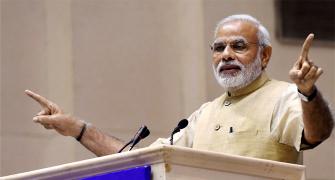Avatar: The Way of Water feels like a poorly chosen present -- the wrapping is beautiful, but the gift inside is a disappointment, observes Mayur Sanap.

We have seen countless major film franchises come and go but few have had the global appeal of James Cameron's record-box office fantasy epic, Avatar.
In 2009, when the writer-director introduced us to the world of Pandora, we were enamoured of the fictional planet whose native inhabitants are called the Na'vi.
If you are a cinema fan, you are well aware that watching an Avatar film is an experience.
It has been 13 years since the cinema maestro unleashed the global phenomenon that we know of today.
There's a rush of being back in Cameron's Avatar universe and seeing some of your favourite characters again.
No wonder the anticipation for long-in-the-making sequel has reached fever pitch and beyond, as it finally releases this holiday season.
It's too bad, though, that this new film titled Avatar: The Way of Water doesn't quite match up to the drooling anticipation of what it could have been.
The Avatar film universe gets a bit bigger, though not appreciably better, with the new entrant.
The story is smaller in scale and more intimate this time around.
Set few years after the events of the first film, human-turned-Na'vi warrior Jake Sully (played by a perpetually bored Sam Worthington) has started a family with his mate Neytiri (Zoe Saldana) and become the leader of her Omaticaya clan.
They are parents to three biological children -- a dutiful eldest son Neteyam (Jamie Flatters), a feisty younger son Lo'ak (Britain Dalton), and a young daughter Tuk (Trinity Bliss) -- as well as an inquisitive adoptive daughter Kiri (Sigourney Weaver in a surprise turn).
Their lives are thrown into turmoil when they are forced to go into exile as human military returns to Pandora for more chaos.
The Sully family explores the different regions of Pandora before seeking refuge with an aquatic Na'vi tribe known as the Metkayina.
But the military baddies, led by Colonel Quaritch's vengeful avatar form (Stephen Lang), are coming after Jake and he must protect his family from the impending danger.
Cameron has once again achieved the grand scale of his vision with The Way of Water.
There is no denying that the film is a visual magnum opus.
The scenery on display is strikingly atmospheric.
The underwater scenes are astounding.
The trippy shots of sea creatures, underwater conversations, camera angles, fighting scenes, location preferences are designed to induce awe and wonderment.
It is mind-boggling how the characters were made with a mix of motion-capture technology and CGI. And it is once again a testament to how good they look!
When they communicate, they don't need to say much and it's still the most nuanced the film gets.
Even when saying or doing little (as little as a glance or a gesture), the expressions captured are perfectly emotive.
The 'look, it's in 3D' shots are not as obvious as some of the other films.
Most 3D films nowadays do not merit the use of it as it does not enhance the film-watching experience -- if anything, it hinders it.
This, however, skillfully aids those scenes.
The idea of the Avatar world is that you can get lost in it and the 3D helps that to a great extent.
Further augmenting the visual language of the film, Russell Carpenter's adept camerawork gives the story's magnitude the scope it deserves. This is a very unique looking production and the sweeping camera movements perfectly compliment the tremendous artwork and design.
But once you delve beneath all the razzle dazzle, this Avatar feels like pretty standard fare.
Whilst we applaud the magician-worthy skills of the technicians at play, it's likely to feel emotionally distant from the story.
The Sully family spends a long time going through exposition, bonding, fitting in, learning aquatic ways, insecurities and distress but never build much of a substantial relationship in the viewer's mind.
It just serves to repeatedly hammer in the superficial point that the protagonist is a family man who loves his kids, but not much else.
The screenplay by Rick Jaffa, Amanda Silver, and Cameron takes its own sweet time to build up the characters, some of them more briefly than others, and to explain their motivations.
The new characters are introduced well, but they are mostly undermined by the shallow screenplay. None of them are explored further and the relationships between them lack the required complexity and depth (especially true with the kids' characters).
With a runtime that exceeds three hours, the story feels pointlessly overlong and often dull.
The narrative structure hinges on a prototype as basic as good vs evil, without much convincing plot development.
Case in point, Quaritch preparing a backup clone of himself in the event of his death makes just as little narrative sense.
Also, humans have had years to develop their war techniques, the Na'vis did nothing, yet the writers make them appear to have upper hand with their primordial weaponry.
Above all, Jake's decision to separate from his forest-dwelling clan to keep his family and himself safe is the most baffling part of the plot as you wonder how hiding would work.
This isn't a film about surprises and twists.
As a result, the story isn't exactly ground-breaking either.
You can probably work out where the film is heading quite early on.
Cameron is too caught up in his passion for creating a visual experience; so we have long scenes focused on the key characters, their surroundings, the hi-tech machinery and so on, without much payoff.
There's even a big plug in the film for marine wildlife conservation, a cause Cameron feels passionate about.
It is this meta environmental message that leaves one rooting for humanity's doom.
The film seems like it's merely going through the motions without adding much depth or delving into the mind of its characters, especially Jake Sully, who remains at a cold distance from the audience.
That makes it hard to root for him or to genuinely care about him.
Unlike the first film, there is just not enough of a window into his heart, mind and soul despite a few scenes attempting to be poignant but resulting in clunky moments.
The script also lacks the intelligent simplicity and nuance of the predecessor and instead resorts to clichés.
A strong lack of emotional core and tension hampers the proceeding.
With nothing significant to drive the story forward, too many scenes drag, especially in the first 90 minutes.
The film struggles to sustain the lingering runtime until it finally kicks into high gear, which makes the things momentarily exciting in the action-heavy climax.
By then, it is less amazing than exhausting.
If you love film beauty and are willing to spend time away from your everyday troubles, this film works as a great sensory treat.
Seeing it all on the big screen, especially in IMAX, would be ideal.
It's just sad that vital elements of the story, character building and emotional payoff have been lost in his translation, rendering the whole experience to empty spectacle.
At the end, Avatar: The Way of Water feels like a poorly chosen present -- the wrapping is beautiful, but the gift inside is a disappointment. That's not the way to go about it.










